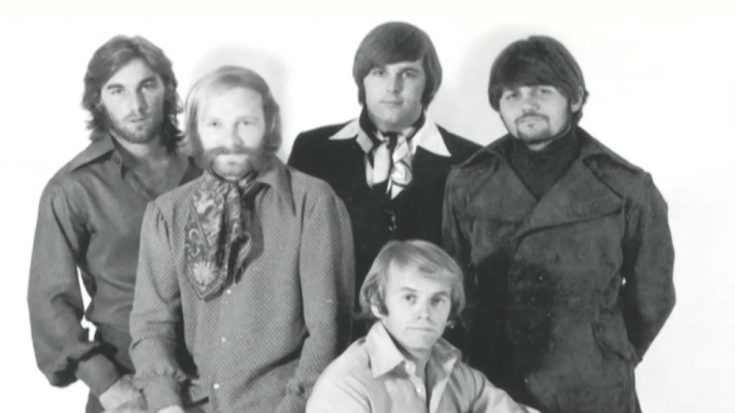Beach Boys Albums That Are Mainly Influenced By Beatles Albums

via Amplified - Music & Pop Culture Documentaries / YouTube
The friendly competition between The Beatles and The Beach Boys is well-documented. When The Beatles first brought Beatlemania to the United States, numerous bands struggled to match the fervor.
The Beach Boys, however, emerged as one of the few capable of keeping up, leading to the inevitable development of a rivalry.
Frequent comparisons arose regarding their avant-garde creations, with varying degrees of validity. These comparisons often stemmed from the rivalry between the two bands and the public’s tendency to contrast their respective works.
Nevertheless, there were occasions when the artistic output of one band directly impacted the other. This became evident in the influence of two specific Beatles albums, which distinctly shaped the musical direction of Beach Boys records.
https://twitter.com/knuckle11875466/status/1732932555845079056
A White Album song inspired the Love & Mercy soundtrack
One of the standout tracks from the White Album, the first in question stands out as one of the most distinctive and unconventional songs in the collection.
The experimental audio collage “Revolution 9”, with its unique characteristics, went on to exert a significant influence on the soundtrack of the 2014 Beach Boys biopic, Love & Mercy. This film serves as a biographical portrayal of Brian Wilson, diving deep into the intricate facets of his love life and mental health.
The cinematic experience offered by Love & Mercy is as unconventional as the narrative it explores, if not more so. What truly sets it apart is its distinctive soundtrack, which is a masterpiece in its own right. The soundtrack doesn’t adhere to traditional norms but rather presents an avant-garde approach.
It cleverly interweaves snippets of classic Beach Boys songs with haunting and atmospheric musical elements. This unique combination adds depth and complexity to the movie’s auditory landscape, enhancing the overall viewing experience and making Love & Mercy a remarkable blend of storytelling and innovative soundscapes.
“We should do something like that”
The director of Love & Merc, Bill Pohlad, shared insights into his collaboration with Brian Wilson, emphasizing the inherent challenges in Wilson’s creative process.
“I mean, one of the first things I think [his wife] Melinda said when I first started to get to know them both a little better was this notion that Brian hears these amazing orchestrations and harmonies and arrangements in his head that are so complex, nobody else can understand them until he actually executes them,” he explained.
To navigate the intricacies of working with Brian, Pohlad sought inspiration from The Beatles. Reflecting on The Beatles’ “Revolution 9” from the White Album, he envisioned a similar approach to simplify the collaborative process. “I was like, ‘We should do something like that,’” the director went on.
Proposing this idea to movie composer Atticus Ross, Pohlad and Ross utilized some of Brian Wilson’s original tapes, deftly merging them to bring to life the Beatles-inspired concept within their cinematic endeavor.
Smiley Smile was also influenced by the Fab Four
The impact of The Beatles on the Beach Boys extended to their 12th studio album Smiley Smile. Following the critical success of Pet Sounds, the band embarked on a journey of experimentation, aiming to push artistic boundaries.
However, this creative exploration led to a complex evolution for the album. Originally intended to be titled Smile, the project faced challenges, encountering resistance from Capitol Records. Compounding the situation, Brian Wilson’s undiagnosed schizophrenia posed an additional obstacle.
Intriguingly, the original vision for the album, with its avant-garde aspirations and ambitious title, never materialized. Capitol Records’ reservations and Brian Wilson’s mental health struggles contributed to the shelving of the initial Smile project.
Consequently, what is accessible today represents a distilled and simplified version of the artistic endeavor, reflecting both the band’s experimentation and the external factors that shaped its complicated history.
A Sgt. Pepper track was another major influence
Two important elements contributed to the creation of a complex and unreleased album—Brian Wilson’s pursuit of a groundbreaking vision and the profound impact of The Beatles’ song “She’s Leaving Home”.
Wilson’s ambitious attempt with Smile was notably ahead of its time, a visionary endeavor that, unfortunately, proved to be too avant-garde for its era, with its significance recognized only 35 years later. Wilson admired the symbolic lyricism crafted by his collaborator Van Dyke Parks for Smile, appreciating its depth even though he never sought an explanation for the lyrics.
For Wilson, the track from Sgt. Pepper’s Lonely Hearts Club Band held immense importance, as he first heard it before its official release during a visit from Paul McCartney to his home.
As McCartney played the song on the piano, its emotional resonance struck a chord with Wilson, leading to a shared moment of profound connection as both musicians found themselves moved to tears by the sheer beauty of the composition.
A positive interplay between two of the most popular bands
The dynamic relationship between The Beatles and The Beach Boys is an iconic paradigm of a constructive rivalry, a positive interplay that many other bands could benefit from emulating.
In this symbiotic creative exchange, each group spurred the other to reach new heights and produce their most exceptional work, potentially propelling both acts further in their careers than they might have independently achieved. The reciprocity of inspiration is particularly evident in the Beach Boys, who drew influence from The Beatles’ groundbreaking records White Album, Sgt. Pepper, and even Revolver.
These albums served as wellsprings of inspiration, fostering a creative environment that influenced not only the Beach Boys’ contemporaneous works but also left an enduring imprint on subsequent Beatles compositions.
The reciprocal nature of this musical cross-pollination is a testament to the power of a healthy rivalry, where each band’s pursuit of excellence becomes a driving force for innovation in the other, resulting in a legacy that extends beyond individual achievements.












